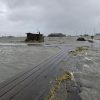As the record-breaking low pressure caused by Storm Ciarán swept across the country in November, millions of Britons were forced to settle for cups of tea that fell short of their expectations. The culprit behind this subpar cup? The unusually low boiling point of water, driven by changes in atmospheric pressure. Meteorologists at the University of Reading, who published their findings in the journal Weather, confirmed that on the morning of the storm, the boiling point of water in Reading was a mere 98 degrees Celsius, a full 2 degrees below the recommended 100 degrees.
This anomaly was no chance occurrence. The barometer plummeted to a record-low 956.0 millibars, corrected to mean sea level, on November 2nd, surpassing readings taken in February 1989 and December 1821. Caleb Miller, a PhD student and co-author of the study, seized the opportunity to conduct experiments on the properties of boiling water during low atmospheric pressure. Miller and his team employed temperature sensors and a standard electric kettle to compare the results with previous boiling points observed under different air pressure conditions.

To measure the broader regional impact of the storm, the researchers combined weather data from various sources, including roadside weather stations across southern England and pressure readings from the Reading University Atmospheric Observatory. This allowed them to track the movement of the pressure minimum across the region, coinciding with traditional breakfast hours. According to Alec Bennett, another co-author, “The effect of pressure on boiling temperatures is long known to mountaineers, but Ciarán brought the effect to a wide region.”
The phenomenon is often overlooked in densely populated areas, but Storm Ciarán brought this effect to the masses. As a result, millions of Britons were forced to contend with underwhelming cups of tea, a bitter pill to swallow.

